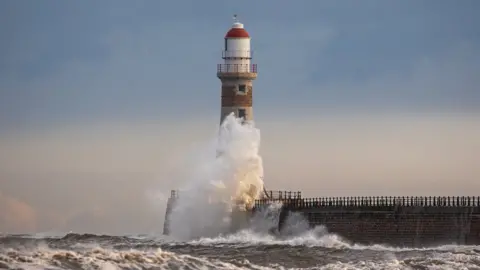Storm Arwen: Red wind warning for parts of UK
 Simon C Woodley
Simon C WoodleyPeople are being urged to avoid travelling as winds of up to 100mph caused by Storm Arwen have hit.
The Met Office has issued a red warning - the highest level - which is issued only rarely, meaning there is potentially a risk to life.
Trains have been heavily disrupted and people are being warned against visiting the coast. The notice runs until 02:00 GMT on Saturday.
Elsewhere there is an amber warning, with winds of 60 to 75mph.
People have been urged to check on elderly neighbours or relatives and put off journeys if possible.
The red warning - which stretches along the east coast from Newcastle to beyond Aberdeen - means dangerous weather is expected and people should take action immediately to keep themselves and others safe.

The Met Office said the "spell of exceptionally strong northerly winds will affect eastern coastal districts of Scotland from later this afternoon moving south into south-east Scotland and north-east England this evening."
A spokesperson warned these strong gusts were likely to generate "some very large waves".
"We are talking about wave heights that really are exceptional," they said.
"I've heard of nine to 10m waves out at sea, which is particularly noteworthy."
The RNLI has warned people should be extremely careful if visiting the shoreline, especially along exposed cliffs, seafronts and piers.
Allow X content?
Rail passengers are being advised to defer their travel plans if possible by London North Eastern Railway.
It has imposed emergency speed restrictions and a number of services have been cancelled or terminated early. More information is available on its website.
Friday's Premiership game between Newcastle Falcons and Worcester Warriors has been postponed.
The match at Kingston Park has been moved to 18:00 GMT on Saturday.
A number of other events, including the Whitby Christmas Festival and the outdoor elements of Hartlepool's Wintertide Festival, have been cancelled.
There is also an amber warning - meaning damage and travel disruption - for other parts of Scotland and north-east England, and a yellow warning for Northern Ireland, Wales and south-west England.
The Met Office said the winds could mean:
- Flying debris resulting in danger to life.
- Damage to buildings and homes, with roofs blown off and power lines brought down.
- Roads, bridges and railway lines closed, with delays and cancellations to bus, train, ferry services and flights.
- Power cuts affecting other services, such as mobile phone coverage.
- Large waves and beach material being thrown on to coastal roads, seafronts and homes.
People are being urged to take precautions, with Northumberland Fire and Rescue Service urging them to secure loose items outdoors.
Allow X content?
The Met Office said temperatures would plummet to below average over the weekend.
Head of civil contingencies, Will Lang, said: "Areas in the north will see temperatures below freezing overnight, with daytime maximum temperatures only getting into the low single figures.
"It's important to note that strong wind speeds ... will exacerbate the cold temperatures we'll be seeing over the weekend."
The UK Health Security Agency (UKHSA) has urged people to check on elderly relatives or neighbours.
A spokesperson said: "Cold weather can have a serious impact on health, particularly for older people and those with heart and lung problems, as it increases the risks of heart attacks, strokes and chest infections.
"Make a call, or a socially-distanced doorstep visit if they live close by, to remind them to heat their home to at least 18C (64.4F) .... and check they have enough food and drinks and any medicines they need."
Rod Dennis, from the RAC, said a red warning was "the strongest possible signal to drivers not to set out in the first place unless absolutely necessary".
'Powerlines falling'
He added: "Drivers in those parts of the UK covered by amber weather warnings should also consider postponing their planned trips until the storm passes.
"As well as making driving much more challenging, strong winds cause an increased risk of trees and powerlines falling - add snow into the equation and the risks increase significantly."
Storm Arwen, the first named storm of the year, is moving south down from Scotland.
BBC Look North weather presenter Jennifer Bartram said: "It is likely to cause damage and transport disruption.
"Coastal flooding is less likely, as we don't have spring tides at the moment, but it will be very dangerous with large waves nonetheless."

Follow BBC North East & Cumbria on Twitter, Facebook and Instagram. Send your story ideas to [email protected].
